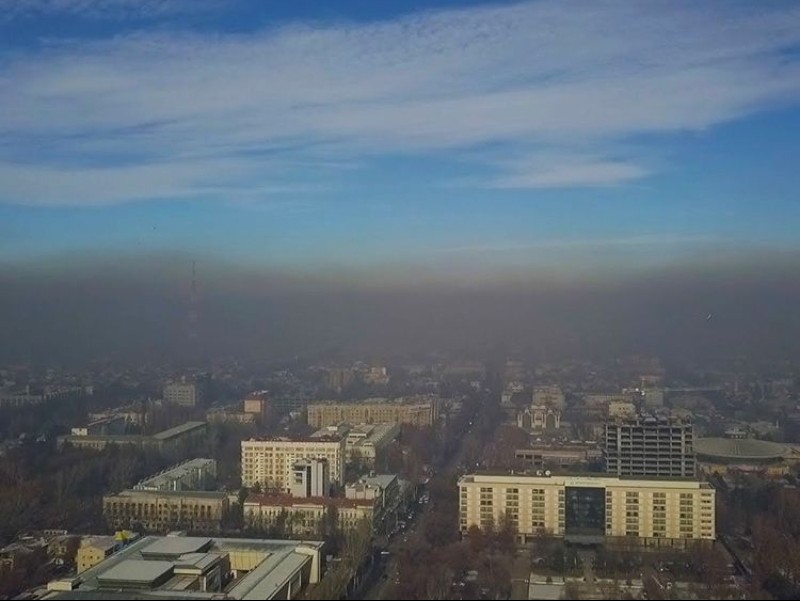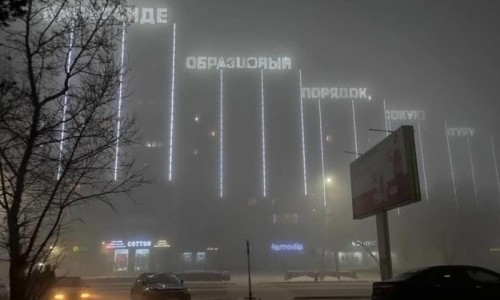
High air pollution during the heating season is one of the main environmental problems in the city, including in Kazakhstan and Kyrgyzstan. For example, in January 2023, a monitoring sensor in Karaganda showed excessive levels of particularly dangerous fine particles PM2.5 - 612 µg/m3, which is 24 times higher than the World Health Organization (WHO) norm!
The concentration of particles with a size of 2.5 micrometers (PM 2.5) is an important indicator of air pollution and its harm to health. According to WHO standards, the average daily level of PM2.5 should not exceed 25 µg/m3.
A similar situation is observed in the capital of Kyrgyzstan - Bishkek. The city regularly ranks among the top five cities with the most polluted air in the world during the heating season!
According to the international online air quality monitoring network, The World Air Quality Index, the air in both Karaganda and Bishkek during winter is often characterized as "very unhealthy" and "hazardous."
The most dangerous levels of PM2.5 pollution occur when burning coal with high sulfur content under unfavorable meteorological conditions.
Considering that air pollution, according to WHO data, is responsible for 30% of additional mortality, the Regional Network of Environmental Experts in Central Asia "GREEN CA" will conduct a public environmental examination of this problem as part of a project supported by the environmental fund Global Greengrants.
In both Kazakhstan and Kyrgyzstan, there are two types of environmental expertise – state and public. Public environmental expertise is an essential mechanism for taking into account the opinions and interests of the public in decision-making that can affect the environment and people's lives.
Public environmental expertise can be a good tool to ensure transparency and democracy in decision-making. Involving environmental experts, scientific organizations, public associations, and the population allows for high-quality and independent research, assess environmental risks, and public health.
To choose the object of public environmental expertise, the "GREEN CA" network conducted a survey among residents of Kazakhstan and Kyrgyzstan in June of this year on the topic "Which environmental problem concerns you the most?" Four answer options were offered based on common problems for both countries and the availability of experts with experience in relevant expertise: air pollution from coal burning, household waste, possible construction of a nuclear power plant, and construction of the Almaty - Issyk-Kul road.
543 people from both countries took part in the survey. Approximately the same number of respondents identified air pollution and household waste as the two main problems (~40%). The problem of nuclear power plant construction came in third. The experts of the "GREEN CA" network decided to choose the problem of air pollution from coal burning in Karaganda and Bishkek as the object of expertise.
As part of the expertise, an analysis of relevant documents, information availability, and legal regulation of this issue will be conducted. The results will be presented at open meetings of all interested parties, including the public and representatives of state authorities.
Experts will prepare proposals for amending legislation to address the problem of air pollution from coal burning and recommendations for conducting public environmental expertise developed for each country during the project.
The Regional Network of Environmental Experts in Central Asia "GREEN CA" was created in 2018 and unites organizations and experts in Central Asia whose activities affect various areas of the interaction between the economy and the environment. The network works for the sustainable use of natural resources, the solution of environmental problems, the implementation of green economy ideas, and low-carbon development. The network was founded by two non-profit organizations - the Karaganda Regional Environmental Museum (Kazakhstan) and the "CAMP Alatoo" NGO (Kyrgyzstan) with the support of the German Society for International Cooperation GIZ (Deutsche Gesellschaft für Internationale Zusammenarbeit).
Photo: @24.kg, @c.p.on
Additional information:
Darhan Askarov
Project Manager at Karaganda Regional Environmental Museum
Email: darhan_2604@mail.ru
Zhrygalbek Kozhoberdiev
Project Coordinator at CAMP Alatoo NGO
Email: zhyrgal@camp.kg

Итоги пастбищного сезона 2018 года были подведены на очередном заседании районной пастбищной комиссии (РПК).
MoreThe development of the unified method, "Monitoring Pastures at the Local Level," is nearing completion.
MoreЧетыре новых моста построены в 2018 году в Кыргызстане при поддержке ОФ “CAMP Алатоо” и Швейцарской ассоциации “Памирские...
More